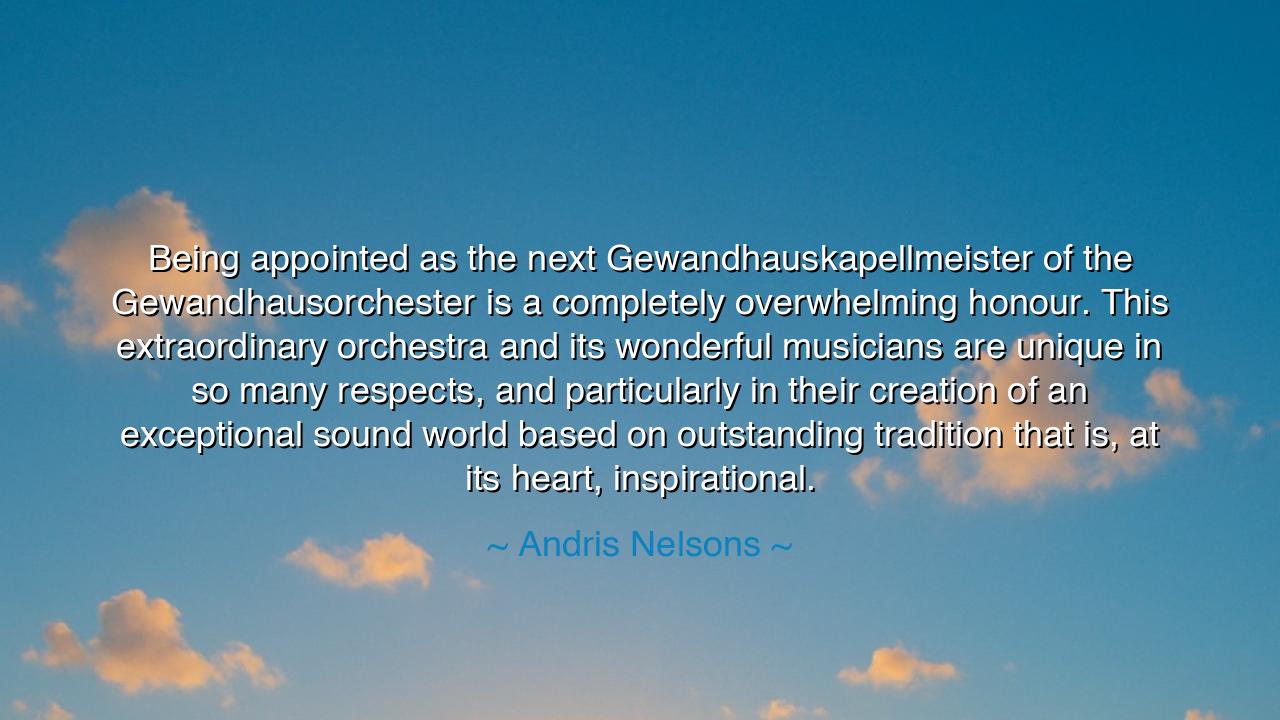
Being appointed as the next Gewandhauskapellmeister of the
Being appointed as the next Gewandhauskapellmeister of the Gewandhausorchester is a completely overwhelming honour. This extraordinary orchestra and its wonderful musicians are unique in so many respects, and particularly in their creation of an exceptional sound world based on outstanding tradition that is, at its heart, inspirational.






In the reverent and eloquent words of Andris Nelsons, we hear the echo of both gratitude and destiny: “Being appointed as the next Gewandhauskapellmeister of the Gewandhausorchester is a completely overwhelming honour. This extraordinary orchestra and its wonderful musicians are unique in so many respects, and particularly in their creation of an exceptional sound world based on outstanding tradition that is, at its heart, inspirational.” To the uninitiated, these may appear as the formal words of a conductor accepting a title. But beneath them lies a truth as profound as any ancient vow — a testament to the sacred bond between art, tradition, and the soul of humanity itself.
The Gewandhausorchester of Leipzig is no ordinary ensemble; it is a living monument of history, a river of sound that has flowed unbroken since the mid-18th century. Its lineage is a tapestry woven with the names of Mendelssohn, Schumann, and Brahms, each having contributed their spirit to its eternal resonance. When Nelsons calls his appointment an “overwhelming honour,” he acknowledges not merely the prestige of his role, but the weight of inheritance — the responsibility to guard and further a tradition built by generations of visionaries. Just as a torchbearer must keep the flame alive without letting it scorch his hand, so too must a conductor honor the past while breathing new life into its fire.
When he speaks of the orchestra’s “exceptional sound world,” he is describing something that transcends technical mastery. The Gewandhaus sound is not a collection of notes; it is a living spirit, a shared memory of centuries that vibrates through every instrument and every performer. It is as though the walls of the concert hall remember every triumph and tragedy that has been played within them — and through that remembrance, the musicians become more than individuals; they become custodians of a timeless voice. This, Nelsons calls “inspirational” — for to work within such beauty is to stand before the divine made audible.
In ancient times, the Greeks believed that music was the breath of the gods, a force that could bring order to the cosmos and harmony to the human heart. The philosopher Plato taught that the soul of a nation could be shaped by its melodies, for music has power to elevate or corrupt the spirit. Andris Nelsons, in his devotion to the Gewandhausorchester, continues that same sacred lineage. His role is not unlike that of the high priests of old who tended to the sacred fires — except his altar is sound, his offering is unity, and his faith is the belief that through tradition, mankind remembers its higher self.
But Nelsons’ words also remind us of humility — that even amidst greatness, the wise do not claim ownership of excellence. They serve it. When he calls his new position “overwhelming,” he is not feigning modesty, but recognizing the truth that no single person can ever truly command something as vast and eternal as a great tradition. The best leaders — whether conductors, teachers, or rulers — do not seek to dominate their charge; they listen, they guide, and they learn. In the same way, Nelsons does not stand above the orchestra but within it, part of a greater whole.
His reverence for tradition is not nostalgia, but an acknowledgment that the past and the present are threads in the same tapestry. Just as Beethoven’s symphonies still ignite hearts centuries after his death, the music of the Gewandhausorchester continues to evolve because it remembers. Tradition, when honored wisely, is not a cage — it is a root. It anchors the artist, even as it nourishes growth. And Nelsons, in calling that tradition “at its heart, inspirational,” teaches that the deepest art does not reject what came before; it transforms it into something new, yet still eternal.
The lesson for us all is this: to serve excellence with humility, and to see tradition not as weight, but as wind. Whether you are a musician, a craftsman, or a dreamer, understand that greatness is never created alone. You stand on the shoulders of those who came before you. Honor them not by imitation, but by devotion — by carrying forward their spirit in your own way. Like Nelsons before his orchestra, listen deeply to the harmony around you, and add your voice to it with courage and care.
For in the end, as this conductor reminds us, to be part of something truly great — whether an orchestra, a lineage, or a purpose — is the highest honor a human being can receive. It is not a crown to wear, but a fire to tend, passed down from one inspired heart to another.






AAdministratorAdministrator
Welcome, honored guests. Please leave a comment, we will respond soon